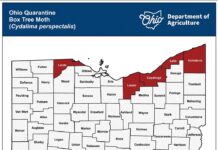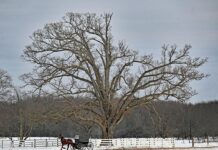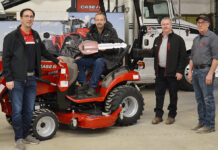SOUTH CHARLESTON, Ohio – He remembers the exact day and time because it goes three, four, five.
April 3, 1974, at 5 p.m.
That was when a tornado – the infamous F-5 tornado that ripped through the city of Xenia, Ohio, just 20 minutes earlier – flattened McDorman Farms. The buildings, the barns, the house – everything that was standing when Louis J. McDorman woke up that morning – lay in shambles around his feet by nightfall.
Some people gave up that day, deciding there was too much damage and not enough fight left in their heart to fix it, but McDorman was not one of those people.
Winner. Now, almost 32 years later, McDorman Farms is being honored as the Ohio Cattlemen’s Association Commercial Cattleman of the Year, an award sponsored by Farm and Dairy. The McDormans will be recognized at the association’s annual meeting Jan. 21 in Newark.
While the destruction in Xenia made the news instantly, McDorman said no one knew about the condition of his South Charleston farm until almost a week after the tornado.
As word spread about the farm, however, people from across Clark County and nearby areas came to pick up trash, move debris and clear the land. McDorman said he had never met many of the people who came to help him put his farm back together.
Now what? Perhaps the biggest challenge after the tornado was figuring out what to do with a herd of cattle that had no home, but McDorman did what any diehard cattleman would do. He put on his boots and moved the 850 animals to another farm.
Within two weeks, McDorman said most of the big debris had been removed, but the family continued to pick up trash all summer. They began rebuilding the barns and feedlots they lost and, two years later, they rebuilt their house.
Making a life. McDorman and his wife, JaNelle, built their lives around the land his grandfather bought just before the Great Depression. Today, the 1,000-acre farm is operated by McDorman and his son, Louis H., plus two employees.
The McDormans do custom cattle feeding and, according to the older McDorman, about one-third to one-half of the cattle on the farm are owned by someone else. Most of the animals come from West Virginia, Tennessee and Kentucky.
As custom cattle feeders, the McDormans provide proper nutrition, shelter and general management for the cattle. Owners and feeders generally work out an arrangement for the specific details of the venture, such as veterinarian bills, medicine and other costs.
McDorman said the operation’s success can be partly attributed to his insistence on buying cattle only from well-managed herds with excellent health programs.
In addition to the custom feeding enterprise, McDorman Farms is home to 50-100 brood cows.
Starting out. Before beginning his career on the farm, the older McDorman spent five years working for Sucher Packing Co. in Dayton. At the packing company, he worked for a man who showed him the ins and outs of cattle operations. Another friend helped the budding farmer learn how to buy cows.
“We went to eight sales a week,” he said. “The cattle moved through here all the time.”
Getting experience. Like his father, the younger McDorman also decided to make his career in the cattle industry. After earning a degree in animal agriculture from Wilmington College, the cattleman spent several years in Guymon, Okla., where he worked as a feed culler at the Henry C. Hitch Feedlot, one of the largest feedlots in the world.
He was responsible for nine miles of feed bunks.
Louis’ job description hasn’t changed since his days at Henry C. Hitch, but his work at McDorman Farms is done on a much smaller scale.
He normally arrives early in the morning and checks out the feed bunks before deciding what to feed. The number of animals and the weather are major factors in determining how often the cattle are fed and how much they get. About 80 percent of the feed is ground on the farm.
Louis summed up his regular routine in just seven words: “Feeding, grinding feed, hauling manure and bedding pens.”
Marketing. The McDormans do their best to keep up with the trends in marketing and produce whatever packers and consumers want.
To put it simply, McDorman said they just aim to “sell what somebody wants.”
“You raise what the customer wants,” he said. “Whatever you want, we’ll feed it.”
One of the modern tools found on this Clark County farm is electronic identification. Each animal has a small electronic tag in its ear. The tag contains information such as pedigree, birth date and health background.
The older McDorman said he can “wave a wand that reads the chip” and the information is transmitted to a computer where it can be read.
One reason to use electronic identification is that it allows for more accurate record keeping. More importantly, the electronic identification gives the McDormans specific information about an animal’s health and vaccination background and information about exactly where it has been. This can be critical information when an animal is sick, and with electronic identification, that data is readily available.
Passion. As with any other farm, there are good days and there are bad days at McDorman Farms. But for McDorman, there’s one simple reason to keep going.
“I like doing it,” he said.
(Reporter Janelle Skrinjar welcomes feedback by phone at 800-837-3419, ext. 22, or by e-mail at jskrinjar@farmanddairy.com.)
Get 4 Weeks of Farm and Dairy Home Delivered










